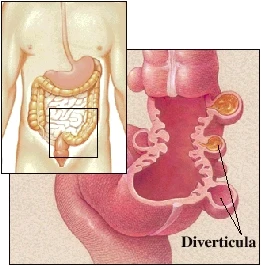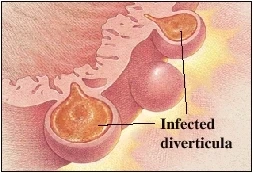Small pouches may form in your colon (large intestine) wall. This condition is called diverticulitis. If the pouches become inflamed, a more serious problem called diverticulitis has developed. Aging may contribute to colon problems. What you eat makes the real difference in the health of your colon.

Managing Your Condition
You and your doctor can discuss how to control your perticular condition. Diet changes or medications may be enough to bring relief. In severe cases, surgery may be needed. Either way, the better you understand your body and your condition, the more you’ll be able to benefit from treatment and be able to avoid colon problems in the future.
If You Have Diverticulosis
- The two main keys to controlling perticulosis are fiber (roughage) and liquid.
- Fiber absorbs water as it travels through your colon, helping your stool stay soft and move smoothly.
- Serious cases of perticulosis may require stool softeners or antispasmodic medications for pain.

If You Have Diverticulitis
- If your perticulitis symptoms are mild, your doctor may begin treatment with a temporary liquid diet and oral antibiotics.
- If your symptoms are relieved, you may be given a high-fiber diet.
- If your perticulitis is severe, you may need hospitalization and intravenous (IV) antibiotics and fluids.
- Surgery may be necessary if other types of treatment don’t successfully control your condition.
Keys to Colon Health
After treatment, help keep your colon healthy with a diet that includes plenty of high-fiber fruits, vegetables, and whole grains. Drink plenty of liquids like water and juice. Your doctor may also recommend avoiding seeds and nuts.
